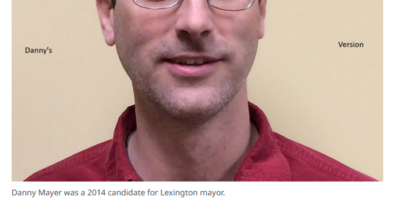Open Letter to members of the University of Kentucky community
March 31, 2013
Dear UK Faculty, Students, and Staff:
I am writing this letter to make you aware of a discriminatory policy that is in place at the University of Kentucky, a policy that I have been personally affected by and which the University continues to stand behind. According to the UK-HMO Description of Benefits and Services, the following health care coverage is listed as an exclusion: “Sex Transformation/Sexual Dysfunction–Services, supplies, drugs or other care related to sex transformation, gender identity, sexual or erectile dysfunction or inadequacies.” Setting aside the problematic conflation of sex transformation and sexual dysfunction, this policy directly discriminates against transgender members of the UK community.
I learned of this exclusion because I have been denied coverage for routine and required medical care that I received in 2011. The background for this situation is as follows: in 2011, I had two appointments with an endocrinologist at the Kentucky Clinic which were necessary for monitoring my continued (and lifelong) hormone therapy. These visits were not related to “sex transformation” since I had legally changed my sex prior to my employment at UK. Coverage of these visits was denied on the basis that any services related to gender identity are not covered. I immediately began to challenge this decision through the appeals process of Kentucky Medical Services. After a back-and-forth exchange that lasted for more than a year, Kentucky Medical Services stated that their decision was final.
At that point, in August 2012, I followed the guidelines for reporting a complaint of discrimination and I took my case to the Office of Institutional Equity and Equal Opportunity. I was assured that my case would be considered by the Kentucky Employee Benefits Committee. According to an email, the Kentucky Employee Benefits Committee discussed changing the coverage policy in their meeting on September 18, 2012, but ultimately voted to maintain the current policy. I was not informed of this decision until March 26, 2013, after I had initiated further investigation into this issue when my outstanding medical bills were sent to a collections agency. After more than two years of fighting this policy, I have resigned to pay the outstanding medical bills and share my story.
In writing this letter, I want to encourage those of you who are invested in an equitable environment at UK to consider addressing three issues that my situation has highlighted:
First, I would encourage you to advocate for a change in the health care benefits provided. The exclusion of “sex transformation” and “gender identity” does not only prohibit coverage for major medical procedures and surgeries, but also everyday and routine care that is medically necessary for a transgender individual to be healthy. At the very least, striking “gender identity” from this policy would enable transgender people to have access to the same health care benefits that are extended to non-transgender people.
Second, I would encourage you to advocate for the addition of “gender identity and expression” to the Nondiscrimination Policy. The current policy provides no protections for transgender faculty, students, or staff. During my official correspondence with UK, this policy was presented to me seemingly to imply that UK has no obligation to consider how their policies discriminate against transgender people. While those of you who remain tied to UK may have a clearer sense, I would suggest beginning this advocacy by contacting the Office for Institutional Diversity and the LGBT Task Force. There is a long and growing list of colleges and universities that protect transgender individuals under their nondiscrimination policy (see, for example, the University of Louisville), and I would hope that UK would want to join their ranks.
Third, I would encourage you to advocate for an improved process for reporting and appealing a case of discrimination. I made contact with the Office of Institutional Equity and Equal Opportunity in August 2012. While the Kentucky Employee Benefits Committee discussed and voted down a policy change in their meeting on September 18, 2012, I was not notified of this vote. Instead, on March 9, 2013, I had to initiate another inquiry regarding my case. It was not until more than two weeks later, March 26, 2013, that I was made aware of the decision that had been made in September, six months earlier. In the meantime, my outstanding medical bills were being handled by a collections agency. This is a disappointing response, to say the least. But perhaps even more concerning than this prolonged and inefficient process of investigating a matter of discrimination is that I have now exhausted the official channels for appealing my case. To my knowledge, the Office of Institutional Equity and Equal Opportunity is the only path for complaint and now that I have heard an official decision I am left without recourse.
As many of you may know, in 2011 The Princeton Review ranked UK as the 19th most LGBT unfriendly campus. The University’s refusal to support basic health care coverage for transgender people that would equal the health care coverage provided to non-transgender employees is a form of targeted discrimination that further supports the public perception of UK as a place where LGBT people are not welcome. While my experiences at UK were generally positive, this issue has tainted the support that I received.
I hope those of you who are invested in the fair treatment of transgender people at UK will seriously consider this appeal. While my case is now closed, the 2+ years that I have been fighting this issue will be worthwhile if some positive change can result.
Thank you for your support!
Best regards,
K.J. Rawson, Ph.D.
Assistant Professor of English
College of the Holy Cross
kjrawson@holycross.edu




Leave a Reply